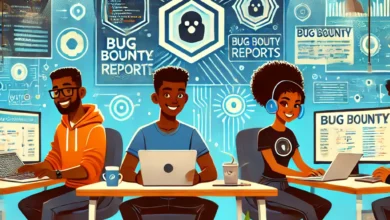Launching Your Cybersecurity Career: The Bridge from Academia to Bug Bounty Success
A Step-by-Step Guide for Emerging Professionals in Cybersecurity

Embarking on a career in cybersecurity and bug bounty hunting is a thrilling prospect for students and recent graduates. The leap from the academic world, with its structured learning and theoretical focus, into the fast-paced, ever-evolving landscape of professional cybersecurity presents a unique set of challenges and opportunities. This comprehensive guide is designed to ease this transition, providing a clear roadmap for turning your academic accomplishments and theoretical knowledge into a successful career in bug bounty hunting and cybersecurity.
The importance of laying a solid foundation in the journey from classroom to cyberspace cannot be overstated. It’s not just about mastering the principles of computer science, networking, and cybersecurity; it’s also about cultivating practical skills that will stand you in good stead in the professional world. This involves everything from honing your technical abilities to understanding the nuances of digital security and threat detection.
However, technical prowess alone isn’t enough to guarantee success in this field. Professional networking, building a compelling portfolio, and gaining tangible experience through internships, freelance projects, and active participation in bug bounty programs are equally critical. These steps enhance your skills and significantly boost your visibility and credibility in the cybersecurity community.
Moreover, as the cybersecurity landscape is inherently collaborative and complex, possessing strong, soft skills—particularly in communication and teamwork—is indispensable. The ability to articulate your findings, collaborate with peers, and contribute to a larger security effort is what often distinguishes a good cybersecurity professional from a great one.
As you stand on the threshold of what promises to be an exciting and rewarding career, this guide aims to arm you with the knowledge, strategies, and insights needed to navigate the transition from academia to the professional world of cybersecurity and bug bounty hunting. Let’s dive into the steps that will help you build a robust foundation, enhance your professional network, and step confidently into the dynamic world of cybersecurity.
Building a Strong Foundation: The Cornerstone of Your Cybersecurity Career
The journey begins with establishing a robust educational foundation for those poised to dive into the cybersecurity and bug bounty-hunting profession. This section explores essential academic and self-taught pathways that form the bedrock of a successful cybersecurity career.
1. Mastering Core Computer Science Principles:
A deep understanding of computer science fundamentals is crucial. Concepts such as programming, data structures, algorithms, and computer networks underpin much of cybersecurity work.
- Example: Proficiency in programming languages like Python, JavaScript, or C++ is invaluable for developing software and understanding and exploiting vulnerabilities. Courses in computer networks can elucidate the intricacies of internet architecture, protocols, and security measures, forming a basis for comprehending and countering network-based attacks.
2. Specializing in Cybersecurity and Network Security:
While a broad computer science education is vital, specialization in cybersecurity principles offers targeted knowledge crucial for bug bounty hunting.
- Example: Formal education might include specialized courses in cryptography, ethical hacking, penetration testing, and digital forensics. These subjects equip you with the tools and techniques to identify, analyze, and exploit vulnerabilities.
3. Engaging with Practical, Hands-on Learning:
Theory and practice go hand in hand in cybersecurity. Engaging in practical, hands-on learning experiences through labs, simulations, and real-world challenges is essential.
- Example: Participating in Capture The Flag (CTF) competitions or utilizing platforms like Hack The Box or TryHackMe can provide practical experience in a controlled, legal environment. These platforms offer challenges across various domains, allowing you to apply theoretical knowledge in practical scenarios.
4. Networking and Community Involvement:
Building a professional network and engaging with the cybersecurity community can provide insights, mentorship, and opportunities not found in textbooks.
- Example: Attend cybersecurity conferences, seminars, and workshops, either in person or virtually. Platforms like LinkedIn, Twitter, and cybersecurity forums also offer avenues to connect with industry professionals, share knowledge, and stay updated on the latest trends and threats.
5. Building a Portfolio:
A well-curated portfolio showcasing your projects, contributions to open-source security tools, and participation in bug bounty programs can be a significant asset.
- Example: Document your process and findings in a blog, GitHub repository, or personal website. This demonstrates your technical skills and commitment to the field and serves as a tangible record of your capabilities for potential employers or collaborators.
The transition from academic learning to a career in cybersecurity and bug bounty hunting begins with a solid foundation in computer science and cybersecurity principles. By combining formal education with hands-on experience, engaging in community involvement, and showcasing your skills through a comprehensive portfolio, you’re well on your way to establishing yourself in cybersecurity’s dynamic and rewarding field.
Gaining Real-World Experience: The Bridge to Professional Expertise
Transitioning successfully from an academic setting into the professional cybersecurity and bug bounty-hunting world demands more than just theoretical knowledge; it requires tangible, real-world experience. This section outlines strategies for acquiring the hands-on experience that is critical for bridging the gap between classroom learning and professional practice.
1. Internships in Cybersecurity:
Internships offer an invaluable opportunity to gain practical experience while still in the educational phase. They provide insight into the day-to-day operations of cybersecurity teams and expose you to real-world challenges.
- Example: Seek internships with companies known for their strong cybersecurity posture or with dedicated cybersecurity firms. These roles can range from assisting in network security assessments to participating in incident response teams, offering a breadth of experience in tackling live security issues.
2. Freelance and Contract Work:
Freelancing or taking on contract work allows you to apply your skills to various projects, often with more flexibility than traditional employment. It’s an excellent way to build experience and demonstrate your capabilities to potential employers.
- Example: Platforms like Upwork or Freelancer can connect you with short-term cybersecurity projects, ranging from security audits for small businesses to developing security protocols for startups. This variety enhances your resume and broadens your understanding of the field.
3. Participating in Bug Bounty Programs:
Bug bounty programs are a cornerstone of practical cybersecurity experience, challenging you to find and report vulnerabilities in exchange for rewards. They are a direct application of bug-hunting skills in a competitive, real-world environment.
- Example: Engage with platforms like HackerOne or Bugcrowd, which host bug bounty programs for a multitude of companies. Successful participation not only yields financial rewards but also recognition within the cybersecurity community, enhancing your professional profile.
4. Contributing to Open Source Security Projects:
Contributing to open-source security projects allows you to work on real software and systems, honing your skills in identifying and fixing vulnerabilities.
- Example: Projects like OWASP WebGoat, a deliberately insecure web application designed to teach security lessons, welcome contributions from the community. By contributing, you gain hands-on experience in secure coding practices and vulnerability remediation.
5. Continuous Learning through Online Platforms:
Online platforms offer structured paths for practical learning, from guided tutorials to hands-on labs that simulate real cybersecurity scenarios.
- Example: Cybersecurity training platforms such as Cybrary, Codecademy, or Pluralsight offer interactive courses and labs in penetration testing, ethical hacking, and more. These platforms allow you to apply theoretical knowledge in practical exercises designed by industry experts.
Gaining real-world experience is a pivotal step in transitioning from a cybersecurity student to a professional. Through internships, freelance projects, participation in bug bounty programs, contributions to open-source projects, and continuous learning on online platforms, aspiring cybersecurity professionals can acquire the practical skills and experience necessary to thrive in the fast-paced and ever-evolving cybersecurity industry. These experiences not only refine your technical abilities but also enhance your understanding of the complexities and nuances of real-world cybersecurity challenges, laying the groundwork for a successful career in bug bounty hunting and cybersecurity.
Cultivating Professional Skills and Networking for Success
While technical acumen forms the backbone of a successful career in cybersecurity and bug bounty hunting, professional skills and networking are equally crucial in transitioning from academia to the professional realm. This section highlights the importance of these skills and provides actionable advice on how to cultivate them effectively.
1. Professional Skills Development:
Effective communication, collaboration with teams, and project management are invaluable skills in the cybersecurity field. Developing these competencies can significantly enhance your career prospects.
- Effective Communication: It is essential to articulate technical information clearly and concisely to non-technical stakeholders. Consider taking courses in technical writing or public speaking to improve your communication skills.
- Team Collaboration: Cybersecurity often involves working within multidisciplinary teams. Participating in team projects, hackathons, or CTF competitions can help you build teamwork skills and understand different perspectives within cybersecurity tasks.
- Project Management: Understanding the basics of project management, including task prioritization, resource allocation, and timeline management, can be beneficial. Tools like Trello or Asana can help you practice managing projects, even personal or academic ones, more efficiently.
2. Building a Professional Network:
Networking is key to uncovering job opportunities, gaining insights into the industry, and staying updated on the latest trends and threats.
- Attend Industry Conferences and Workshops: Events such as DEF CON, RSA Conference, or local meetups offer opportunities to meet professionals in the field, learn from their experiences, and get exposed to new ideas and technologies.
- Join Online Communities and Forums: Platforms like Reddit’s r/netsec, Twitter’s cybersecurity community, or professional groups on LinkedIn allow you to engage with peers, share knowledge, and discuss trends and challenges in cybersecurity.
- Mentorship: Seeking a mentor can provide personalized guidance and support as you navigate your career path. Many professionals are willing to share their knowledge with eager newcomers; don’t hesitate to reach out to someone whose work you admire.
3. Building a Portfolio:
A well-documented portfolio showcasing your projects, contributions to open-source security tools, or successful bug bounty reports can be a powerful tool in demonstrating your skills to potential employers or collaborators.
- Document Your Learning and Projects: Use platforms like GitHub to host your code or a personal blog to write about your cybersecurity adventures, challenges you’ve tackled, and what you’ve learned from them.
- Highlight Participation in Competitions: Including your participation in CTFs, hackathons, or bug bounty programs in your portfolio showcases your practical skills and dedication to the field.
Transitioning into a professional career in cybersecurity and bug bounty hunting requires a combination of technical prowess, professional skills, and effective networking. By focusing on developing strong communication and collaboration skills, building and leveraging a professional network, and showcasing your achievements through a comprehensive portfolio, you can significantly enhance your visibility and value in the cybersecurity community. These elements, combined with the technical foundation and real-world experience discussed in previous sections, equip you with the comprehensive skill set necessary to succeed and thrive in the dynamic field of cybersecurity.
Charting Your Path to Cybersecurity Excellence
The transition from academia to a thriving career in cybersecurity and bug bounty hunting is a journey marked by continuous learning, skill refinement, and community engagement. As you stand at the precipice of this exciting and challenging field, it’s crucial to remember that the path to success is both personal and unique. Whether your ambition is to become a renowned bug bounty hunter, secure a pivotal role in a cybersecurity team, or pioneer innovative security solutions, the insights and strategies outlined in this guide are designed to be your compass.
1. Embrace a Growth Mindset:
The world of cybersecurity is perpetually in flux, with new threats, tools, and methodologies emerging regularly. Maintaining a growth mindset—embracing challenges as opportunities to learn and expand your skill set—is essential. Stay curious, be willing to venture out of your comfort zone, and view setbacks not as failures but as valuable learning experiences.
2. Set Clear Goals and Pursue Them Relentlessly:
Define what success looks like for you in the cybersecurity realm. Setting clear, achievable goals—whether it’s landing your first role in cybersecurity, reporting a significant bug, or contributing to an open-source security project—can provide direction and motivation. Break these goals down into actionable steps and commit to pursuing them with determination and resilience.
3. Leverage Your Unique Strengths:
Cybersecurity is a vast field with numerous specialties. Whether your strength lies in technical analysis, creative problem-solving, or effective communication, there’s a place for you. Identify your unique strengths and interests and seek opportunities that align with them. This alignment not only enhances your chances of success but also ensures a fulfilling and engaging career.
4. Contribute to the Community:
The cybersecurity community thrives on collaboration and shared knowledge. By actively contributing—whether through sharing your research, participating in discussions, or volunteering for community projects—you not only enrich the ecosystem but also enhance your visibility and reputation within the field.
As this guide concludes, let it mark the beginning of your proactive journey into the cybersecurity and bug bounty-hunting profession. The transition from academic learning to professional practice is an adventure filled with opportunities for growth, challenges to overcome, and milestones to achieve. BugBustersUnited is here to support you every step of the way, providing resources, insights, and a platform for collaboration and knowledge sharing.
We invite you to share your journey, challenges, successes, and insights with the BugBustersUnited community. Your experiences contribute to your personal growth and inspire and inform others embarking on similar paths. Together, we can build a stronger, more resilient cybersecurity ecosystem, safeguarding the digital world against evolving threats.
Let’s embark on this journey with enthusiasm, preparedness, and a commitment to excellence. Your path to cybersecurity success starts now, and we can’t wait to see where it leads. Share your thoughts, questions, and suggestions with us, and let’s foster a vibrant community of cybersecurity professionals ready to tackle the challenges of tomorrow.







